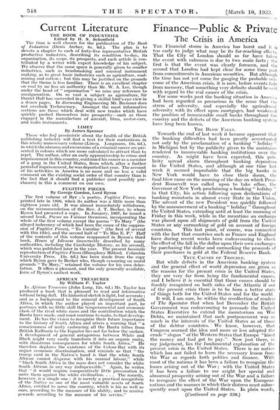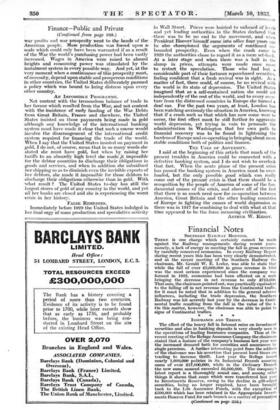Finance—Public & Private .
The Crisis in America
THE Financial storm in America' has burst and it is too early to judge what may be its far-reaching effects. That the City of London should so far have taken the event with calmness is due to two main facts ; the first is that the event was clearly foreseen, and the second that London had kept clear for some time past from commitments in American securities. But although the time has not yet come for gauging the probable out- come of the American crisis, it is now, before events fade from memory, that something very definite should be said with regard to the real causes of the crisis.
For some weeks past the banking situation in America had been regarded as precarious in the sense that the stress of adversity, and especially the agricultural adversity with its effect upon mortgages, had weakened the position of innumerable small banks throughout the country and the defects of the American banking system have long been known.
THE BLOW FALLS.
Towards the end of last week it became apparent that the banking difficulties had been greatly accentuated not only by the proclamation of a banking " holiday " in Michigan but by the publicity given to the assistance rendered to innumerable banking institutions over the country. As might have been expected, this pub- licity spread alarm throughout banking depositors in the United States, and although at one time last week it seemed improbable that the big banks in New York would have to close their doors, the final blow came on the morning of the day on which Presi- dent Roosevelt was called upon to take office, the Governor of New York proclaiming a banking " holiday " in that City, his action following upon declarations of banking moratoria in almost every State in the Union.. The advent of the new President was quickly followed by the announcement of a banking " holiday " throughout the United States, extending until at least the morning of Friday in this week, while in the meantime an embargo was placed upon all shipments of gold from the .United States or any earmarking of gold on account of foreign countries. This last point, of course, was Connected with the fact that countries such as France and England hive during recent weeks been endeavouring to check the effect of the fall in the dollar upon their own exchanges by purehaSing the dollar and earmarking the proceeds of their purchases in gold at the Federal Reserve Bank.
: - TauE,CAUSES OF -.TROUBLE. But while defects in the 'American banking system and the general effect of world depression are given as the reasons for. the pre-sent crisis in the United States, they are very far from being the' fundamental causes, and I believe it is essential that those causes should be frankly recognized on both sides of the Atlantic if out of the present crisis there is to be bOrn a better state of things both for the United States and for the world. It will, I am sure, be within the recollection of readers of The Speetatoi that when last 'December the British Government was endeavouring to persuade the United States ExeCiitiVe "to extend the moratorium on War Debts, we maintained that such postponement was as much in the interests 'of the United States as of those of the debtor _countries. : We , know, - however, that Congress scorned the idea and more or less adopted the crude " slogan " of the Western States that Europe "hired the money and had got to pay.", Now just there, in my judgement, lies the fundamental explanation of the present crisis in the United States. There is no nation which has not failed to learn the necessary lesson from the War as regards both politics and finance. With most of the nations it has been a failure to recognize the losses arising out of the War ; with the United States it hai been a failure to use aright her special and abnormal proSperity arising out of the War and a failure to recognize the effect of the War upon the European nations and the manner in which their distress must subse- quently react upon the United States. In plain words, (Continued on page 350.)
Finance—Public and Private
(Continued from page 348.) _ war profits and war prosperity went to the heads of the American people. Mass production was forced upon ar scale which could only have been warranted if as a result Of the War the world's purchasing power had been vastly increased. Wages in America were raised to absurd heights and consuming power was stimulated by the instalment system in every possible way. And yet, at the very moment when a continuance of this prosperity must, of necessity, depend upon stable and prosperous conditions in other countries, the United States deliberately pursued a policy which was bound to bring distress upon every other country. AN LLFOSSIBLE PROGRAMME.
Not content with the tremendous balance of trade in her favour which resulted from the War, and not content with the insistence of early 'funding of the War Debts from Great Britain, France and elsewhere, the United States insisted on those payments being made in gold although any knowledge of the international banking system must have made it clear that such a course would-- involve the disarrangement of the international credit system required for financing the trade of the world. When I say that the United States insisted on payment in gold, I do not, of course, mean that in so many words she stated she must have gold, but when by raising her tariffs to an absurdly high level she made /it impossible for the debtor countries to diScharge their obligations in goods and services, and when in addition she subsidized .her shipping so as to diminish even the invisible exports of her debtors, she made it impossible for those debtors to :discharge their obligations otherwise than in gold. With what result ? The United States to-day has still the largest stores of gold of any country in the world, and yet all her banks are closed and she is experiencing the worst crisis in her history. FALSE REXEDIES.
- Immediately before 1929 the United States indulged in her final orgy of mass production and speculative activity in Wall Street. Prices were hoisted to unheard of-levels and yet leading authorities in the States declared that 'there was to be no end to the movement, and when President 'Hoover-himself came into office four years ago he also championed the - arguments of continued un- bounded prosperity. Even when the crash came in 1929 the authorities chose to regard it as a mere set-back. -At a later stage and when there was a halt in the slump in prices, attempts were made once more to restart the speculation. Those who had lost a considerable part of- their fortunes repurchased securities, feeling confident that .a fresh revival was in sight. As a matter of fact, there could, Of -course, be no revival with the world in its state of depression. The United States imagined that as a self-contained nation she could act independently-of the-rest of the world, and--to every over- ture from the distressed countries in Europe she turned a deaf car. 'For the, past two years, at least, London has been watching anxiouslythe situation in America, knowing that if a crash such as that which has now come were to occur, the first effect innst be still further to aggravate world depression, yet trying in vain to persuade the -administration in - Washington- that her own path to financial recovery was to be found in lightening the burdens of Europe and co-operating in bringing about-more stable conditions both of politics and finance. " THE USES OF ADVERSITY. • I said at the beginning of this article that much of the present troubles in America could be connected with a -defective banking system, and I do not wish to overlook that fact. When the acute phase of the present crisis has passed the banking system in America must be over- -hauled, but _the _only possible good which can really come out of the present crisis, is -that there should be a recognition -by the people of America of some of the fun- damental causes of the crisis, and above all of the fact that there is as much need now for co-operation between America, Great Britain and the other leading countries of Europe in fighting the causes of world depression as there was in 1917 for combining to deal with what at that time appeared to be the force menacing civilization. ARTHUR W. KEDDY.







































 Previous page
Previous page